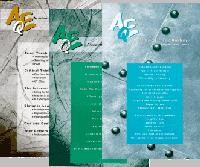Expanding Universe

Academic Exchange Quarterly
The following article was published in the Academic Exchange Quarterly during my tenure with the journal as copy editor. Publication information is listed at the end of the essay.
I hate writing without a word processor. It isn't just that my handwriting is illegible (it is--if I could, I would type everything rather than use a pen). The word processor gives me the obsessive freedom to hang on to all of those false starts and, sometimes, cull the best parts of them into my final copy. In fact, what might have been false starts when writing with paper and pen, clumsy struggles that would have filled the plastic pail beside my desk, become instead self-reflection, my mind grappling with my ideas, my knowledge, my inspirations--and my insecurities. The fragments of thought staggered across my computer screen can be shuffled and re-shuffled, dealt, palmed, stacked, in seemingly endless combinations until suddenly something begins to take shape, and I have words I can live with. The word processor has changed the way I write, the way I think, and even the way I teach.
My first semester in a computerized classroom, I abandoned the lectern and sat side by side with students over their documents, helping them tease meaning from the words on the screen, helping them shape the emerging meaning into something they could accept as theirs with pride. I watched students who had been frightened of writing grow more confident. And while the computer didn't make them better writers, it did make the process easier and less painful.
In the beginning, word processing was the primary technology available to those of us who teach English. Now there is more. Students access my class notes online. They e-mail me for help with assignments. In one class, my laptop computer becomes a virtual whiteboard where I can type instead of scrawling in colored ink across the board, where what I write can become a permanent record for my later reference instead of disappearing with a few swipes of an eraser. Our library offers students Internet access to a wide variety of resources--book, reference, magazine and journal articles, web pages--ready access to more resources than were previously available on the library shelves, and perhaps more importantly, 24 hour access from home. This past year I taught two online sections of Composition I, posting assignments, leading discussion forums, chatting, e-mailing instructions, directing students to traditional and Internet resources, grading and evaluating electronic submissions.
Does all of this technology replace traditional resources--face-to-face teaching, the library shelves, the visit to the office for a conference? No. But it is a welcome supplement, an extension of my reach and the school's reach into the lives and education of our students.
Bill Stifler
Copy Editor
Chattanooga State Community College
Academic Exchange Quarterly 4.3 (2000): 20.